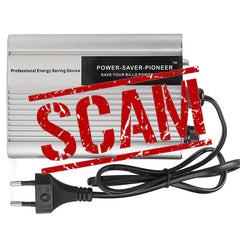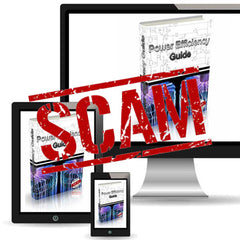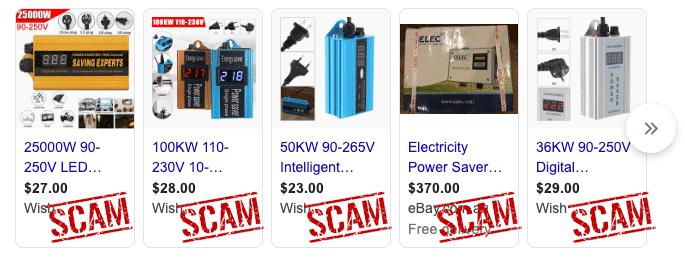Over the years, I've seen plenty of power-saving scams. They often claim to save vast amounts off your electricity bills.
The problem is, they all rely on a grain of truth in their marketing spiel. So these devices often sound technically plausible.
They can seem legitimate on the surface, even though they are not.
On the plus side, scammers are generally quite lazy. So the vast majority of energy-saving scams currently on the market look much the same as they did ten years ago.
Hopefully this blog post will help you spot them!
Examples of Power Saver Scams
Here are some examples:
 Some are little devices that plug-in to a power socket and magically reduce your electricity bill. These devices use bogus techno-jargon like 'dirty power' to sound smart and get your money. If you buy one, you'll get a cheap plastic box with a plug on it that won't reduce your electricity usage. They include devices like the Eco-Watt, EcoPlug, MiracleWatt, Voltex, Voltbox, Voltizer, and others. There will always be a new name: Voltex (getvoltex.com) was uncovered so fast they just made a new website for the similarly named Volt Box (getvoltbox.com). By the time you read this, they'll probably have another new name.
Some are little devices that plug-in to a power socket and magically reduce your electricity bill. These devices use bogus techno-jargon like 'dirty power' to sound smart and get your money. If you buy one, you'll get a cheap plastic box with a plug on it that won't reduce your electricity usage. They include devices like the Eco-Watt, EcoPlug, MiracleWatt, Voltex, Voltbox, Voltizer, and others. There will always be a new name: Voltex (getvoltex.com) was uncovered so fast they just made a new website for the similarly named Volt Box (getvoltbox.com). By the time you read this, they'll probably have another new name.
 Others get wired or plugged in at your meter board to supposedly perform power factor correction on your electricity usage. Examples include the Earthwise Power Saver, the Power Saver Pioneer, Energy Saver 1200, and others. These devices often say that they 'reduce amps' or 'correct power factor'. As I'll explain below, power factor correction is a real thing, but it won't help residential electricity users.
Others get wired or plugged in at your meter board to supposedly perform power factor correction on your electricity usage. Examples include the Earthwise Power Saver, the Power Saver Pioneer, Energy Saver 1200, and others. These devices often say that they 'reduce amps' or 'correct power factor'. As I'll explain below, power factor correction is a real thing, but it won't help residential electricity users.
 Yet others are junk concepts conveyed via an over-priced e-book. Recent examples include the Easy Power Plan or Power Efficiency Guide eBooks. The fun thing about these two is that they're both written by a "geography teacher from Memphis, Tennessee" with two different names and ages, who would have thought! They talk about a 'spinning principle' to effectively create a free energy machine. Spoiler alert: free energy machines don't exist (more on this below). But the allure of such a device will continue to make the fraudsters rich.
Yet others are junk concepts conveyed via an over-priced e-book. Recent examples include the Easy Power Plan or Power Efficiency Guide eBooks. The fun thing about these two is that they're both written by a "geography teacher from Memphis, Tennessee" with two different names and ages, who would have thought! They talk about a 'spinning principle' to effectively create a free energy machine. Spoiler alert: free energy machines don't exist (more on this below). But the allure of such a device will continue to make the fraudsters rich.
Power Scams Promoted by Mainstream Media & Big Brands
I first wrote about these devices back in 2011 when Today Tonight and A Current Affair both ran stories on the Earthwise Power Saver.
Proponents claimed the device could save up to 40% off residential electricity bills. By the way, the bogus device cost about $1,500 to get installed. These news shows got right behind it, no questions asked, but the whole thing was a fraud.
Around the same time, you could buy a widget called 'Enersonic' from Harvey Norman. It was a scam of the plug-in variety, and thankfully, in this case, the ACCC finally caught up with them.
Nowadays, people are more likely to shop online. And here the situation only gets worse. You can buy these fake gadgets on Wish, AliExpress, and Alibaba direct from China - no real surprises there. Somewhat more disappointingly they turn up frequently on Google Shopping, Amazon and eBay as well.

Google, Facebook & others all make money off these fraudulent products. Just take a look at these sponsored Google shopping results.
Even where there is a vetting process, things are not much better. Scams of the free energy variety are somewhat common on start-up sites like Indiegogo and Kickstarter.
In summary, most organisations cannot be trusted to shield you from these scams. They've tricked a lot of people. But some quick research reveals the dubious nature of the claims made.
Power Scam Type 1: Magic Widget or Box
The sales pitch for these is about cleaning up your power. Power saver sites talk about 'dirty electricity' (or other techno-babble) to convince readers of the need for their device.
For the Earthwise Power Saver scam on Today Tonight, they came across surprisingly well. This is because most of the time they were not actually telling fibs:
"It's a power factor correction unit." - Geoff Hourigan
"It reduces the current." - Greg Paxton
And herein lies a problem. The business owner says it himself, it is a power factor correction unit.
Reality: Power Factor Correction Is Real, BUT...
Residential electricity customers, and most small businesses, do not pay for poor power factor. So, even IF these devices correct power factor, they will not change your electricity bill.
Power factor correction will reduce your apparent power consumption. It does not affect real power (what you are billed for).
For large consumers, such as office buildings and heavy industry, power factor correction will often cut a component of the bill. These sites pay for their peak power consumption in kilovolt amperes (kVA) as well as their real power consumption in kilowatt hours (kWh).
Have a look at your energy bill. If you do not pay for peak demand in kVA you will not benefit from power factor correction.
Power Scam Type 2: Secret Info / Free Energy Machine
The second type of scam I have seen are informational. Such the sale of an eBook which will show you how to build a free energy machine. Or the funding of a new business venture to build such a device.
Of course, they're always from some novice. If this garbage was real, they would not be selling you an ebook about it for $27. They'd be manufacturing the thing and selling it to you for a lot more.
Oh wait, I think that's how Scam Type 2 becomes Scam Type 1. Help!
Reality: The Laws of Physics
Brian Dunning of Skeptoid.com has an explanation:
"The reason that no free energy machine can work, or will ever work, should go without saying; but since the claims continue to persist, it bears a mention.
A perpetual motion machine would violate the laws of thermodynamics. Strictly speaking, it is unscientific for me to say that no free energy machine will ever work. But the fundamental laws of the universe are established to such a huge degree of certainty that it's a limb upon which I'm willing to go out.
Specifically, the first law of thermodynamics states that the energy of any closed system remains constant. If you take any energy out of it at all — for example, to make a rotor spin — then you must put in at least an equivalent amount of energy.
The second law of thermodynamics states that entropy in an isolated system can only increase but not decrease. Basically, systems seek thermal equilibrium. This law prohibits any process in which the only result is that heat moves from a region of lower temperature to a region of higher temperature, or where heat is converted purely into work.
All free energy concepts are impossible because, by definition, they violate one or both laws."
You Can't Rely on Government Regulators
One of the questions raised by my earlier blog posts on this topic is:
"Why doesn't the Office of Fair Trading or the ACCC do something about it?"
Well, it turns out they do, they just take a while to get their case together, if at all.
I found at least one ACCC (Australian Competition & Consumer Commission) ruling about a plug-in device called the Enersonic Power Saver.
They had all the usual claims:
"by using the Power Saver, domestic consumers could save up to 24% on their electrical power consumption... [they] would thereby save money."
But, the reality was more like this:
"the Power Saver was not capable of reducing the amount of electrical power consumed by domestic consumers as measured by retail electricity suppliers, and therefore domestic consumers could not save up to 24% on their electrical power consumption by using the Power Saver... [they] could not save money by using the Power Saver."
Quotation's from the ACCC website - Media Release - 18 October 2010.
There are a number of concerning things about this ruling. It helps to explain why other scammers don't seem too worried about flogging their products. Most notably:
- The punishment is not much of a deterrent. The distributor of the product simply had to put a notice on their website, notify customers and pay a contribution to the ACCC.
- The product was sold back in 2008 and 2009 but it wasn't until late 2010 that a ruling was handed down.

In another 'win' for regulation, the 'Go 4 Green' power saver was recalled by Product Safety Australia (link). Not because it was a scam (which it was), but because it caused electric shocks to some users!
I don't mean to be too negative, in fact, I am quite happy to see that the ACCC eventually does get around to it.
In other news, the scam promoted by Channel Seven and Channel Nine News above re-appeared in 2012 as 'Save My Power.' In 2013 the company behind it all listed for insolvency.
Summary: How to Avoid Being Scammed & Start Saving Energy
First of all, if the device looks or sounds like one of the products mentioned above, it could be a scam.
A healthy dose of scepticism, plus some online research, should set you straight.
Now, this does not mean that anything that plugs-in and claims to save energy is some kind of trick. For example, standby power eliminators and power meters are plug-in devices that actually do help you save power!
Next, you should re-double your efforts on proven strategies to save energy. They're easier, cheaper, and obviously far more rewarding. You know, all those 'boring' things like:
- Checking your power usage with a power meter or energy monitor.
- Changing all your lights to LED.
- Switching to low-power heating & cooling systems.
If you're still in research mode, check out these helpful resources:
- Discover the top ten causes of high electricity bills.
- Find out how to read your energy bills.
- Use this free online appliance electricity cost calculator.













